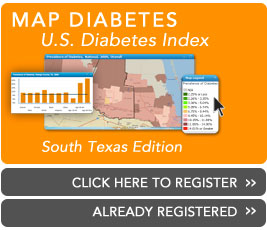Posted by Staff
Minority Diabetes Reports
Wednesday, April 2nd, 2014
The Diabetes Educator: March 31, 2014
Purpose The purpose of this study was to refine and expand a culturally tailored individual-level diabetes self-management intervention to a family-level intervention.
Methods Using community-based participatory research principles, Mexican American adults (n = 12) with type 2 diabetes mellitus (T2DM) and family members (n = 12) in the United States–Mexico border region participated in 6 focus group interviews, conducted by bilingual, bicultural facilitators. Facilitators and barriers to T2DM management were identified. Transcripts were analyzed using qualitative content analysis.
Results Through an iterative analysis process, 5 categories represented participants with T2DM: (1) strategies my family can use to support our managing T2DM, (2) be sensitive to my challenges, (3) stop telling me what to eat or do, (4) how can we peacefully coexist, and (5) I feel supported. Categories identified by family members were (1) changing behaviors together, (2) sharing not controlling, (3) supporting positive behaviors, and (4) your behaviors frustrate me. Read More
Posted by Staff
Minority Diabetes Reports
Wednesday, April 2nd, 2014
The Diabetes Educator: March 31, 201
Purpose The purpose of this study is to explore the influence of the social environment, including family and community relationships, on diabetes-related dietary change behaviors in a low-income, predominantly African American community with limited access to healthy foods.
Methods Study methods included interviews and focus groups with adults with diabetes and family members of individuals with diabetes in a low-income African American community. In this analysis, interview participants included 11 participants with diabetes, one with prediabetes, and 8 family members or close friends with diabetes. Information from 4 participants with diabetes and 6 with family members with diabetes was included from 6 focus groups. Transcripts were analyzed via thematic iterative coding influenced by social cognitive theory to understand the influence of family and community relationships on dietary change. Read more
Posted by Staff
Minority Diabetes Reports
Wednesday, April 2nd, 2014
FDA: 3/25/14
You inherit more than your eye and hair color from your family. You can also inherit a predisposition for diabetes, a disease that disproportionally affects racial and ethnic minorities.
The Office of Minority Health (OMH) at the Food and Drug Administration (FDA) is building relationships with the American Diabetes Association (ADA) and other groups to help Americans prevent and treat diabetes, and to address the disparity in how severely it affects minority groups in particular.
The American Diabetes Association Alert Day on March 25, 2014, is a one-day wake-up call to inform people about the dangers of diabetes, especially when left undiagnosed or untreated. The annual event, on the fourth Tuesday of March, is a reminder for people young and old to take the ADA’s Diabetes Risk Test, which includes simple questions about your family history, weight, age and other potential risk factors for diabetes. Read More
Posted by Staff
Minority Diabetes Reports
Wednesday, April 2nd, 2014
The Diabetes Educator: March/April 2014
Results of a Two-year Culturally Tailored Intervention
Purpose The purpose of this study is to test the feasibility of conducting a community-based randomized controlled trial evaluating a culturally tailored community-based group diabetes self-management education (DSME) program among rural African Americans.
Methods Thirty-two African American rural adults with type 2 diabetes were recruited and 25 adults were retained and participated in an interventional study designed to test the effectiveness of the “Taking Care of Sugar” DSME program for the 2-year follow-up. Participants were selected from rural central Virginia. Primary outcomes variables included average blood sugar levels, cardiovascular risk factors, and general physical and mental health. These outcomes were assessed at baseline, 3 months, 6 months, and 12 months post baseline. Read More
Posted by Staff
Clinical Trials
Wednesday, April 2nd, 2014
Nejm:
3/31/14
BACKGROUND
In short-term randomized trials (duration, 1 to 2 years), bariatric surgery has been associated with improvement in type 2 diabetes mellitus.
METHODS
We assessed outcomes 3 years after the randomization of 150 obese patients with uncontrolled type 2 diabetes to receive either intensive medical therapy alone or intensive medical therapy plus Roux-en-Y gastric bypass or sleeve gastrectomy. The primary end point was a glycated hemoglobin level of 6.0% or less. Read More
Posted by Staff
Clinical Trials
Wednesday, April 2nd, 2014
Diabetes Care: March 25, 2014
OBJECTIVE This study aimed to assess the efficacy and safety of our newly developed nasal glucagon-like peptide-1 (GLP-1) compound and injector.
RESEARCH DESIGN AND METHODS Twenty-six patients with type 2 diabetes were enrolled in this double-blind placebo-controlled study. The nasal compound containing 1.2 mg of human GLP-1 (7–36) amide or placebo was administered immediately before every meal for 2 weeks.
RESULTS The plasma peak concentration of active GLP-1 was 47.2 pmol/L, and its Tmax was 8.1 min. The early phase of insulin and glucagon secretion were recovered and suppressed, respectively, in the GLP-1 group. Glycoalbumin levels became significantly lower and 1,5-anhydroglucitol levels significantly higher after GLP-1 administration. No marked adverse events were observed after using nasal GLP-1. Read More
Posted by Staff
Clinical Trials
Wednesday, April 2nd, 2014
Diabetes Care March 21, 2014
OBJECTIVE To evaluate the effectiveness of a telephone-delivered behavioral weight loss and physical activity intervention targeting Australian primary care patients with type 2 diabetes.
RESEARCH DESIGN AND METHODS Pragmatic randomized controlled trial of telephone counseling (n = 151) versus usual care (n = 151). Reported here are 18-month (end-of-intervention) and 24-month (maintenance) primary outcomes of weight, moderate-to-vigorous-intensity physical activity (MVPA; via accelerometer), and HbA1c level. Secondary outcomes include dietary energy intake and diet quality, waist circumference, lipid levels, and blood pressure. Data were analyzed via adjusted linear mixed models with multiple imputation of missing data. Read more



























